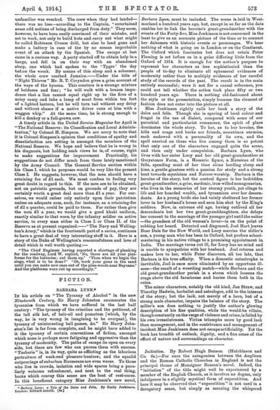FICTION.
BARBARA LYNN.*
IN his article on "The Tyranny of Alcohol" in the new Nineteenth Century, Sir Harry Johnston enumerates the tyrannies from which we have suffered in the last half .century " The tyranny of the crinoline and the petticoat, of the tall silk hat, of hair-oil and pomatum [which, by the way, he is very wrong in imagining to be overpast], the tyranny of uninteresting ball games, Ste." Sir Harry John- ston's list is far from complete, and he might have added to it the tyranny of certain conventions of fiction, amongst which none is perhaps more fatiguing and oppressive than the tyranny of modernity. The paths of escape lie open on every side, but there are few who can pursue them with success. " Tnsherie " is, in its way, quite as afflicting as the laborious portraiture of week-end pleasure-hunters; and the squalid outpourings of suburban Rousseaus are even worse. To those who live in crowds, isolation and wide spaces bring a pecu- liarly, welcome refreshment, and next to the real thing, books which convey this sense are the best of rest-cures. In this beneficent category Miss Jenkinson's new novel, • Barbara Lynn Tale of Me Palm and Folio. By Emily Jentrinson. Loudon: Edward Arnold. [61.] Barbara Lynn, must be included. The scene is laid in West- morland a hundred years ago, but, except in so far as the date enables her to link the heroine's great-grandmother with the events of the Forty-five, Miss Jenkinson is not concerned in the least to give us an accurate picture of the time or to connect her daleemen with historic events or personages. We hear nothing of what is going on in London or on the Continent. The Oxford which fascinates but does not retain Peter Fleming is set before ns in a guise differing little from the Oxford of 1914. It is enough for the author's purpose to represent her characters as less sophisticated than the people of to-day to eliminate all ephemeral evidences of modernity rather than to multiply evidences of her careful study of the records of the past. The result is in the main entirely successful ; were it not for a casual reference, you could not tell whether the action took place fifty or two hundred years ago. There is nothing old-fashioned about the style or the presentation, simply because the element of fashion does not enter into the picture at all.
Mies Jenkinson rightly calls her book a story of the dales and fells. Though she is sparing of local colour and frugal in the use of dialect, compared with some of our parochial and particularist romancers, the spirit of place dominates the whole story. To her, as to her heroine, the hills and crags and becks are friends, sometimes enemies, each endowed with a personality of its own, and the spell exerted on those who live among them is so potent that only one of the characters engaged quite the scene, and then only under compulsion. Barbara Lynn, who lives with her sister Lucy and her old great-grandmother at Greystones Farm, is a Homeric figure, a Nausicaa of the fells, spending most of her time alone herding sheep and kine, a gentle giantess with a passion for study and a strong bent towards mysticism and Nature-worship. Barbara is the heroine of the story, but the central figure is her bedridden great-grandmother, a grim, sardonic, iron-willed nonagenarian, who lives in the memories of her stormy youth, yet clings to life and her hoarded wealth, and tyrannizes over her descen- dants. As a young bride she had vainly sheltered her former lover in her husband's house and seen him shot by the King's soldiers. Now, in extreme old age, having outlived all her descendants but her two great-granddaughters, she delays her consent to the marriage of the younger girl untilthe suitor —the grandson of the old woman's lover—is on the point of robbing her hoard. Detected and disgraced, Joel Hart leaves Boar Dale for the New World, and Lucy marries the Miller's son, a young man who has been to Oxford, but prefers school- mastering in his native village to a promising appointment in India. The marriage turns out ill, for Luoy has no mind and is unable to sympathize with her husband. Joel returns and makes love to her, while Peter discovers, all too late, that Barbara is his true affinity. When a domestic catastrophe is inevitable, Joel is once more eliminated by an opportune ill. ness—the result of a wrestling match—while Barbara and the old great-grandmother perish in a storm which loosens the crags above the old farmhouse and buries them both in the ruins.
The minor characters, notably the old hind, Jan Straw, and Timothy Hadwin, herbalist and astrologer, add to the interest of the story ; but the leek, not merely of a hero, but of a strong male character, impairs the balance of the story. The miller's son does nothing to justify the author's glowing description of his fine qualities, while the would-be villain, though constantly on the verge of violence and crime,is foiled by his own irresoluteness. Virtu. triumphs more by good luck than management, and in the contrivance and management of incident Miss Jenkinson does not escape artificiality. Yet the book has breadth of outlook, dignity, and a fine sense of the effect of nature and surroundings on character.














































 Previous page
Previous page